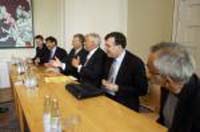Finance ministers of G-8 to convene in Moscow
A resurgent Russia opens its chairmanship of the Group of Eight nations this weekend with finance ministers from the world's wealthiest nations convening for talks that will focus on oil and energy security. Russia, whose economy has been rejuvenated by high oil prices, nevertheless said that diversifying energy sources was a key issue. The finance ministers are also slated to discuss the effect of soaring oil prices on global economic growth.

"This is not just a question of supplies of oil or gas, though they of course play a serious role," Finance Minister Alexei Kudrin said Thursday. "We are also talking about the rules of the game in the sphere of energy finding alternative sources, be it atomic, hydrogen or wind energy... Diversification of energy sources is a pressing question on the world agenda today as is increasing the transparency of world energy markets," he said.
Russia has selected energy security as the central theme for its July summit in St. Petersburg. This weekend, finance ministers from Britain, Canada, France, Germany, Italy, Japan, and the United States are also expected to discuss the fight against infectious diseases including avian flu and efforts to stem financing for terror networks.
China, Brazil, South Africa and India, which are not members of the G-8, will attend a meeting focusing on international trade. World Bank and International Monetary Fund chiefs will also attend as well as a representative of the European Union. While economists fear soaring oil prices could knock the wind out of the world economy, the high price of crude and gas has been largely responsible for Russia's economic turnaround since it defaulted on its debts in 1998.
Russia is widely expected to tout a pledge to pay down the bulk of its remaining Soviet-era debt to the Paris Club of creditor nations some US$12 billion ( Ђ 10 billion) this year. Russia also has said it will extend a debt forgiveness deal brokered at last year's G-8 summit and waive US$688 million ( Ђ 576 million) owed mainly by impoverished African nations.
Despite Russia's key role as a major energy supplier, it has yet to be admitted as a full member of the group and has been largely kept out of discussions among the finance ministers on big issues such as exchange rates and the U.S. budget deficit.
Some U.S. lawmakers and non-governmental organizations have called for Russia to be excluded from the group it was invited to join in the 1990s, saying it does not share the other G-8 members' democratic values and fails to measure up economically.
Russian President Vladimir Putin vehemently defended Russia's membership last week. The nation was at once able to prevent the group from becoming an "assembly of fat cats" by fighting for poorer nations from the perspective of a developing country, he said, while simultaneously wielding the clout of a former superpower as nuclear security mediator.
But despite the energy security buzzword, critics have questioned Russia's reputation as a reliable supplier to energy-hungry Europe, which presently relies on Russia for a quarter of its gas consumption. They cite an ugly New Year gas price war with Ukraine that saw supplies to Europe temporarily shut off. The dispute was seen to be partly aimed at undermining Ukraine's fledgling western-leaning government, instead of a simple shift to market-based pricing as Russia's natural gas monopoly Gazprom contends, reports the AP.
N.U.
Subscribe to Pravda.Ru Telegram channel, Facebook, RSS!


